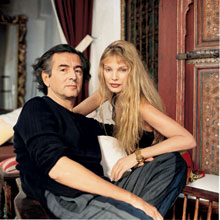Why The West Intervened in Libya: Was This A Surprise?
Via Steve Sailer, I learn that prominent French Jew Bernard-Henri Levy is claiming credit for having persuaded President Sarkozy to press successfully for Western intervention in Libya.
In the New York Times story to which Sailer links, By His Own Reckoning, One Man Made Libya a French Cause By Steve Erlanger April 1, 2011, Levy is quoted saying:
“I’m proud of my country, which I haven’t felt for many years.”
In a well-conducted interview by Der Spiegel “We Lost a Great Deal of Time in Libya Because of the Germans“ 03/30/2011 he reveals his activism stems from
“the moral and spiritual tradition in which I grew up. For me, it’s the definition of Judaism. Being Jewish means having more obligations than rights.”
Although generally described as a “Philosopher” Bernard-Henri Levy appears to be more of a loud-mouthed domineering ideologue of the stripe of Norman Podhoretz. He was actually born in Algeria. Steve Sailer does a perfectly good job of supplying perspective, but The Lies of Bernard-Henri Lévy by Doug Ireland In These Times March 3 2006 is a draught of exquisitely refined vitriol.
Levy has a history of demanding Western military intervention in such places as Bosnia and Darfur. With America’s Neocons clearly quite up to the task of making the Iraq venture happen, he chose to posture against its legality.
Why would President Sarkozy pay any attention to Levy, who said to Der Spiegel
I am an opponent of Sarkozy and his policies. I did not vote for him and I will not vote for him. But it’s no secret that we know each other well.
and who is obviously an arrogant and conceited hysteric?
While Levy told Der Spiegel
I told him that there would be a massacre if Gadhafi made it to Benghazi, and that the French flag that had been flying above the Corniche since the previous evening would also be soiled with blood in this massacre. He was very moved by these words. There are emotional moments in which even statesmen react in a very normal and human way.
when we consider who Sarkozy is, we may surmise something other than the French flag moved him.
Sarkozy’s father, who was born and raised in Hungary (where the family were minor — Christian — aristocrats) but emigrated to France, deserted his family in 1959 when his son was 4. His mother was the daughter of a Sephardic Jew from Salonika in Greece who converted to Catholicism on marrying a French Catholic, taking the Christian name Benedict. According to Nicolas Sarkozy, new President of France: Past and Future Ranaan Eliaz European Jewish Press 06/May/2007
Sarkozy’s grandfather, Aron Mallah, nicknamed Benkio, was born in 1890. Beniko’s uncle Moshe was a well-known Rabbi and a devoted Zionist who, in 1898 published and edited “El Avenir”, the leading paper of the Zionist national movement in Greece at the time. His cousin, Asher…was elected as the first President of the Zionist Federation of Greece and he headed the Zionist Council for several years.
Although Benedict integrated fully into French society, he remained close to his Jewish family, origin and culture.…Nicolas was especially close to Benedict, who was like a father to him. In his biography Sarkozy tells he admired his grandfather, and through hours spent of listening to his stories of the Nazi occupation, the “Maquis” (French resistance), De Gaulle and the D-day, Benedict bequeathed to Nicolas his political convictions.
The article opens with a very pro-Zionist quotation by Sarkozy.
Sarkozy’s son married the daughter of a wealthy French Jewish family – and for what it is worth, his second wife remarried to a Moroccan Jew.
So the critical impulse to involve America and the West in yet another Middle Eastern morass came from a Jew and an intense philo-Semite – politically one might even say a crypto-Jew.
Having the West in full scale military collision with the Muslim world – especially in nearby countries – is clearly helpful to Israel.
Few non-Zionists would see any benefit to those countries actually doing the fighting.
When these adventures are proposed, it is imperative to ask not why but who?






Comments are closed.